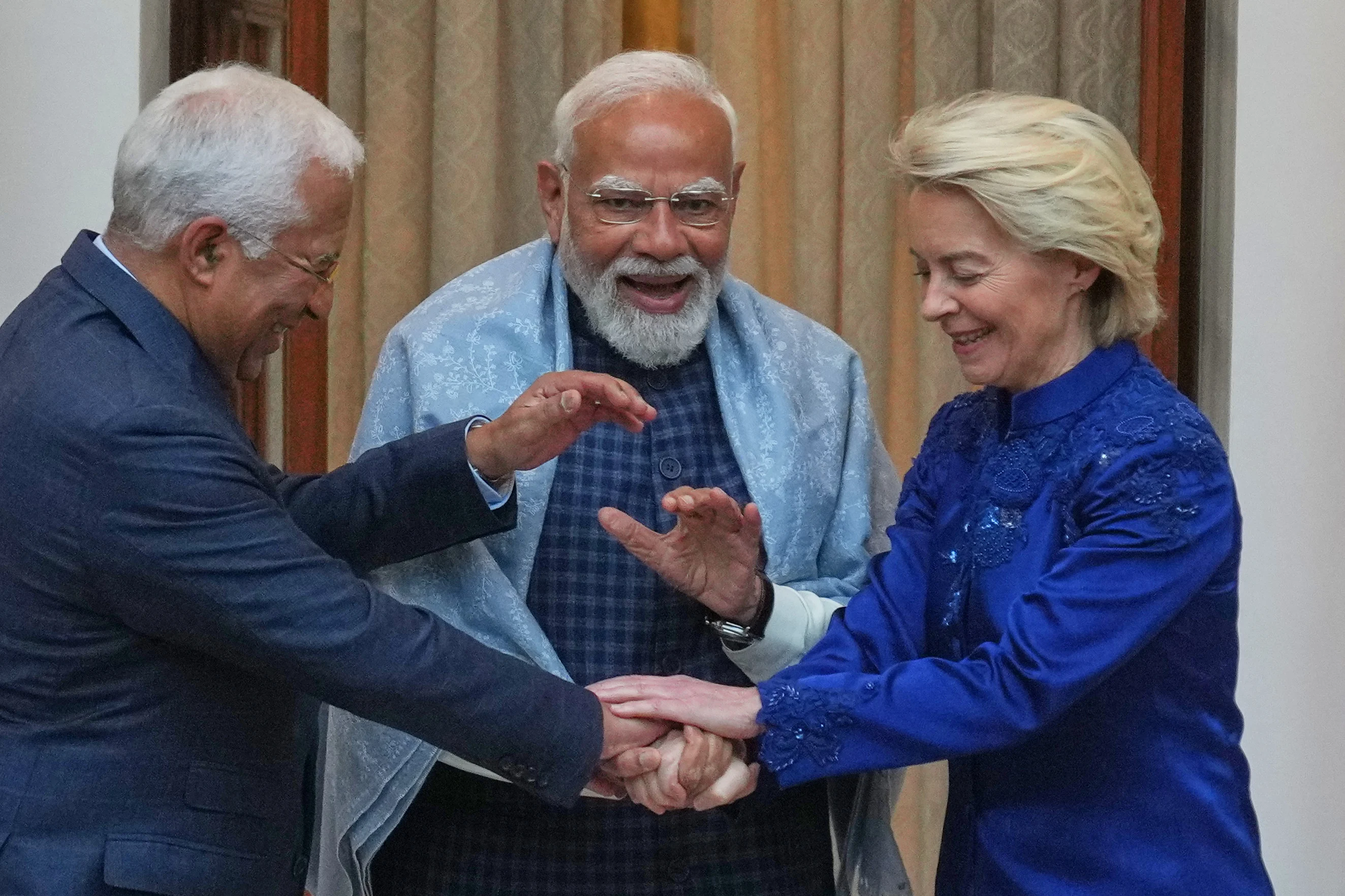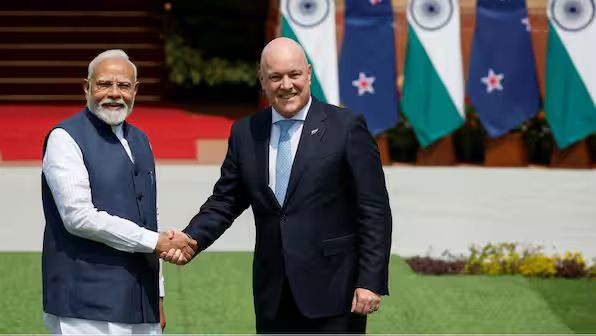Top Trending Business News & Highlights


One accord, three setbacks India's use of the EU trade pact to boil Turkey, Pakistan, and Bangladesh
The United States has also been affected by India's trade agreement with the European Union. The historic trade deal between India and the EU would not only affect Bangladesh and Pakistan but also the United States and Turkey. The agreement calls for the elimination or reduction of tariffs on more than 90% of EU goods exports to India, including hefty charges of up to 44% on machinery, 22% on chemicals, and 11% on pharmaceuticals, which will be phased down over time.Following nearly two decades of negotiations, officials announced on Tuesday that India and the European Union have achieved a free trade agreement to strengthen economic and strategic ties. Up to 2 billion people might be impacted by the agreement, which the president of the EU's executive body referred to as the "mother of all deals." The accord won't go into force for some months. The agreement between two of the largest markets in the world comes as Washington imposes high import taxes on both the EU bloc and the Asian behemoth, upsetting long-standing trade patterns and forcing major economies to look for new alliances. The FTA, which both India and the 27-nation EU refer to as "the mother of all deals," provides a "decisive boost" to the labor-intensive textile industry by improving price competitiveness and expanding market access in one of the most sophisticated consumer markets in the world, according to a note released today by the Indian Textile Ministry.
Published 29 Jan 2026 12:51 PM


India and New Zealand wrap up free trade negotiations despite persistently high US tariffs
Free trade agreement (FTA) talks between India and New Zealand came to an end on Monday amid hefty US tariffs that have unsettled investors and led to the cancellation of orders from India's biggest export market. In the context of 50% US tariffs, the New Zealand agreement, if signed, would be India's second free trade agreement (FTA) following the Oman agreement. It would also be the country's third accord this year as it works to diversify its exports.According to information made public by the government, Wellington would remove tariffs on 100% of its tariff lines for all Indian exports, while India has committed to lower tariffs on 95% of New Zealand exports. However, New Zealand's typical tariffs are among the lowest in the world—between two and three percent—and their removal could not immediately boost exports. In order to bring some symmetry to the agreement, New Zealand has "committed" to investing $20 billion in India over the next fifteen years in exchange for market access in a rapidly expanding Indian consumer market that is subject to high tariffs (over 15%). Because of the unfair tariff rates, New Zealand may benefit more from goods trade than India.In 2024–2025, bilateral trade between India and New Zealand was only $1.3 billion. "This FTA opens doors for Indian businesses in the region through well-integrated directional exports and gives our youth choices to learn, work, and grow on a global stage," stated Commerce Minister Piyush Goyal."India's strengths are expanding exports, supporting labor-intensive growth, and power services," stated Commerce Secretary Rajesh Agrawal. New Zealand's access to India's sizable and expanding economy is deeper and more reliable. These qualities are brought together by the migration of individuals, professionals, students, and skilled workers. The FTA contains provisions to address non-tariff barriers through improved regulatory cooperation, transparency, and streamlined customs, sanitary and phyto-sanitary (SPS) measures, and technical barriers to trade disciplines, according to the Commerce and Industry Ministry, in addition to tariff liberalization. According to the Ministry, "all systemic facilitations and fast-track mechanisms for imports that serve as inputs for our manufactured exports ensure that tariff concessions translate into effective and meaningful market access."
Published 22 Dec 2025 10:28 PM


What workers, brokers, and policyholders stand to gain from travelers' agreement to preserve 1,400 jobs in Canada
The Canadian business of Travelers will be acquired by Definity Financial Corp. The total value of the acquisition is $3.3 billion. Definity will become the fourth-largest property and liability insurer in Canada as a result of this transaction. Every one of Travelers Canada's 1,400 employees will continue to work there. Consumers can anticipate competitive pricing and additional options. Regulatory permission is needed for the deal. By early 2026, it should be closed.Definity Financial Corp. plans to pay $3.3 billion to acquire the Canadian operations of the US behemoth Travelers, one of the largest transactions in Canada's insurance industry in recent memory. This merger could change the competitive environment for both insurers and consumers. More than 1,400 Traveler employees across Canada will retain their employment when the two companies combine under a single brand, despite the fact that large acquisitions frequently result in job losses.Definity will move up from sixth place to become Canada's fourth-largest property and liability insurer as a result of the purchase. Its expanding presence in the insurance industry is demonstrated by the $6 billion in total yearly premiums it currently manages.
Published 28 May 2025 07:58 PM


Why did India decide to remove the "Google tax" in response to pressure from the US?
The Center intends to eliminate the 6% equalization levy (EL) it levies on digital advertisements as part of the 35 modifications to the Finance Bill, 2025, effective April 1, 2025.The Central government has suggested to eliminate the equalization levy on internet advertisements as part of revisions to the Finance Bill, 2025, a move that is anticipated to help American large technology companies and allay US worries about India being a high tariff country.As part of changes to the Finance Bill, 2025, the central government has proposed doing away with the equalization levy on online ads. This is expected to benefit big IT companies in the US and ease concerns about India being a high-tariff nation.The equalization charge, also referred to as the Google tax, will be eliminated by the Center on April 1. The clause is one of 59 changes to the Finance Bill that Finance Minister Nirmala Sitharaman made on Monday and presented to Parliament.
Published 25 Mar 2025 08:42 PM


Business
Business globally are the pillars of any economy and they contribute in huge amount to take any country ahead financially and economically and boost the country grwoth.


Govt allows onion exports to Bangladesh, Mauritius, Bahrain and Bhutan
The government on Thursday permitted traders to export 54,760 tonnes of onion to Bangladesh, Mauritius, Bahrain and Bhutan till March 31. We have allowed export of 50,000 tonnes of onion to Bangladesh, 1,200 tonnes to Mauritius, 3,000 tonnes of Bahrain and 560 tonnes to Bhutan with immediate effect," Consumer Affairs Secretary Rohit Kumar Singh told PTI. Traders are allowed to export this quantity till March 31. The modalities are being worked out, he said. Singh said the decision has been taken following a recommendation from the external affairs ministry. Currently, there is a ban on onion exports till March 31. The ban was imposed on December 8, 2023, in order to boost the domestic supply and check price rise.


Govt hits 79% of revised EV targets under FAME II as of February 18
The Ministry of Heavy Industries has achieved 79 per cent of its revised target for the number of electric vehicles (EVs) — in two-, three-, and four-wheelers — that it had to support under Faster Adoption and Manufacturing of (Hybrid &) Electric Vehicles in India II (FAME II) as of February 18 (including vehicles under processing for subsidy). The revised number of vehicles across the three segments was pegged at 1.73 million in the five years of the scheme (previously 1.5 million) which ends on March 31. Based on segments, the target achieved in electric two-wheelers is 78 per cent, for electric three-wheelers 88 per cent, and for electric four-wheelers much lower at 56 per cent. The details were divulged by the ministry in a FAME II conclave held on February 20 with EV original equipment manufacturers (OEMs) from these three segments.However, the government has to process 514,064 EVs, accounting for 37 per cent of the total number of vehicles under the scheme whose application for subsidy under FAME II is still pending until February 18. Since 2019-20, as many as 1.36 million EVs have applied for subsidy under the scheme. The revised outlay for subsidy for the three segments for five years was at Rs 7,048 crore — which includes Rs 5,311 crore for electric two-wheelers, Rs 987 crore for electric three-wheelers, and Rs 750 crore for electric four-wheelers. Of this, the government has spent and distributed Rs 4,047 crore until February 18, or 57 per cent of the total money earmarked. In 2023-24 (FY24), the disbursements until February 18 have been Rs 2,167 crore.The scheme’s total funding was enhanced from Rs 10,000 crore to Rs 11,500 crore, which includes electric buses, charging stations, and grants for creating capital assets.The ministry said that the subsidies for demand incentive would be eligible for two-, three-, and four-wheelers until March 31, 2024, or until the funds are available.


India Accepts All Foreign Investment In The Space Industry
In an effort to facilitate business in the nation, the Indian government approved an amendment on Wednesday that permits 100% foreign direct investment (FDI) in the space sector. The government stated in a statement that the FDI policy reform will encourage growth in investment, income, and employment. The government stated in a statement that the FDI policy reform will encourage growth in investment, income, and employment.


Onion export ban to continue till Mar 31 to keep prices under check: Govt
The ban on export of onion will continue till its previously announced deadline of March 31 as the government is keen to keep prices under check and ensure domestic availability, a top official said on Tuesday. On December 8, 2023, the government had banned export of onion till March 31. Ban on onion exports has not been lifted. It is in force and there is no change in the status," Consumer Affairs Secretary Rohit Kumar Singh told PTI. The government's supreme priority is to ensure enough domestic availability of onion at reasonable prices to consumers, he added. On reports of lifting of the export ban on the commodity, the modal wholesale onion prices shot up 40.62 per cent to Rs 1,800 per quintal on February 19 in Lasalgoan, the country's largest wholesale onion market, from Rs 1,280 per quintal on February 17. Ahead of general elections, the ban is unlikely to be lifted even after March 31 as rabi (winter) onion production is expected to be lower due to less coverage of area especially in Maharasthra, sources said. In the 2023 rabi season, onion production was estimated to be at 22.7 million tonnes. The Agriculture Ministry officials will assess the rabi onion coverage in key growing states of Maharsthra, Madhya Pradesh and Gujarat in the coming days. Meanwhile, the export of onion to friendly countries is allowed on a case-to-case basis after approval from the inter-ministerial group.


Day after rejecting proposal, farmers ask Centre to accept their demands
Farmer leader Sarwan Singh Pandher on Tuesday sought that the Centre accept their demands, including a legal guarantee on the minimum support price (MSP) for crops and farm loan waiver, and said they will head to Delhi on Wednesday. On Monday evening, SKM (Non-Political) leader Jagjit Singh Dallewal had said, "After holding discussions on two of our forums, it has been decided that the Centre's proposal is not in the interest of farmers and we reject it. Asked if their call for a march to Delhi still stands, Pandher had said, "We will move to Delhi peacefully at 11 am on February 21.The protesting farmers have been staying put at the Shambhu and Khanauri border points between Punjab and Haryana, after their "Delhi Chalo" march to press the BJP-led Centre for various demands, including a legal guarantee on the MSP for crops, was stopped by security forces. The Samyukta Kisan Morcha (Non-Political) and the Kisan Mazdoor Morcha are spearheading the "Delhi Chalo" march. Talking to reporters at the Shambhu border point between Punjab and Haryana on Tuesday, Pandher, who represents the Kisan Mazdoor Morcha, said the farmers have three big demands -- a legal guarantee on the MSP for all crops, the implementation of the "C2 plus 50 per cent" formula as recommended by the Swaminathan Commission and loan waiver. Replying to a question, Pandher said at the meeting with the Union ministers, the farmers proposed that a law on the MSP be enacted by convening a special session of Parliament. On the issue of loan waiver, he said according to government reports, farmers have a total debt to the tune of Rs 18.5 trillion.


Indias economic growth may exceed 6% for rest of the decade: Goldman Sachs
India’s economic growth may exceed 6 per cent for the rest of the decade, driving more investments from China into the South Asian country, Goldman Sachs Group Inc.’s India economist said. Potential growth is an estimate of the pace an economy can grow at withoucuts ausing excess inflation. India’s central bank governor last month estimated the nation’s potential growth rate was around 7 per cent.Goldman Sachs expects the private sector in India to accelerate investments after nationwide elections. Businesses have deleveraged aggressively and their balance sheets are among the “cleanest that we have seen India in the last 20 years or so,” he said. The Reserve Bank of India is expected to wait for the Federal Reserve to move before adjusting monetary policy, he said, adding that the RBI’s actions will come in three phases, including easing liquidity, a change in the policy stance followed by interest rate cut.


India, UK trade pact talks at advance stage; we want a fair deal: Govt
The negotiations for the proposed India-UK free trade agreement are at an advanced stage, and both sides are working to iron out differences on the remaining issues, a top government official said on Thursday. Commerce Secretary Sunil Barthwal said the negotiations are taking time because "we want" to safeguard India's interest. India should commercially gain out of it and we should also be able to safeguard the interest of our farmers, PLI (production linked incentive) scheme goods. So, we are there to see that the deal is a fair deal," he told reporters here. Additional Secretary in the Commerce Ministry L Satya Srinivas said the talks are at an advanced stage and going on at a "very" high level to iron out differences. The 14th round of talks started on January 10.The investment treaty is being negotiated as a separate agreement between India and the UK.The bilateral trade between India and the UK increased to $20.36 billion in 2022-23 from $17.5 billion in 2021-22.On the India-European Union (EU) free trade agreement, the ministry informed that the seventh round of talks is scheduled from February 19-23 here. In June 2022, India and the EU restarted the negotiations for the long-pending trade and investment agreement on Friday after a gap of over eight years.On the India-Pacific Economic Framework for Prosperity (IPEF), Additional Secretary in the ministry Rajesh Agrawal said that legal scrubbing of text on clean and fair economy agreements is underway. He said the supply chain resilience pact will come into force from February 24 this year. To implement this, he said, action plans are being developed to optimise participation in institutional structures under the supply chain pact.


Services trade surplus hits record $44.9 billion in December quarter
India’s services trade surplus shot up to a record $44.9 billion in the October-December quarter (third quarter, or Q3) of 2023-24 (FY24), growing 16 per cent year-on-year, showing resilience amid strong global headwinds. This is likely to reduce the current account deficit (CAD) in Q3. According to the Reserve Bank of India (RBI) data, services exports grew 5.2 per cent to $87.7 billion during Q3, while services imports contracted 4.3 per cent to $42.8 billion during the same period. India’s CAD moderated to 1 per cent of gross domestic product (GDP) in the first half (April-September) of FY24 from 2.9 per cent of GDP during the same period of 2022-23 (FY23), on the back of a lower merchandise trade deficit and higher net services receipts. Fitch Ratings has projected CAD to narrow to 1.4 per cent of GDP in FY24 and 2024-25 from 2 per cent of GDP in FY23. IDFC Bank has revised downward its CAD estimate to 1.2 per cent of GDP from 1.5 per cent, incorporating a higher monthly services surplus. In the Economic Review released ahead of the Interim Budget, the finance ministry last month said services exports, with a compound annual growth rate (CAGR) of 7.1 per cent during 2011-12 through FY23, combined with the CAGR of remittances of 4.5 per cent during the same period, enabled India’s current account balance to remain within a comfortable range. India’s services exports range from information technology to services provided by doctors and nurses abroad. While the RBI doesn’t release monthly disaggregated services exports data, its classification of services exports released quarterly with balance of payment data includes transport, travel, construction, insurance and pensions, financial services, telecommunications, computer and information services, and personal, cultural and recreational services, and other business services. While software exports dominate India’s services exports, “other business services” exports that primarily include global capability centres (GCCs) have seen a strong ramp-up recently, accounting for 26.4 per cent of the total services exports in the first half (April-September) of FY24, from 19 per cent in 2013-14.


Dilli Chalo protest: Farmers call ceasefire for now, say will try again tomorrow
Farmers are demanding a law on minimum support price for crops and have said it will march towards Delhi after their talks with a team of union ministers failed on Monday. Farmer leaders on Tuesday evening declared a temporary ceasefire for today and said they would continue with their protest from tomorrow morning. Addressing the media on Tuesday, the farmers said they are worried about the well-being of their members. “Around 60 of our men have sustained injuries. The government is provoking us by attacking us with tear gas shells and rubber bullets,” they said. Farmers are demanding a law on minimum support price for crops and have said it will march towards Delhi after their talks with a team of union ministers failed on Monday. Earlier in the day, farmers began to remove the barricades at the Punjab-Haryana (Shambhu) border, following which the Haryana police fired rounds of tear gas to disperse them. After the confrontation between the farmers and the police at the Shambhu border (Haryana-Punjab), the Tikri border was sealed by the Delhi Police, according to news agency PTI. Additionally, all entry and exit points of the surrounding streets and villages that connect to the highway near Tikri Metro Station were also closed. 'Delhi Chalo' agitation is spearheaded by SKM splinter group Samyukta Kisan Morcha (Non-Political) and the Kisan Mazdoor Morcha. It urged all like-minded farmer organisations to unite and take part in the February 16 Gramin Bharat Bandh called by the central trade unions. News agency PTI said SKM has written to Prime Minister Narendra Modi demanding Minimum Support Price for crops, slamming action on the farmers' 'Dilli Chalo' march and accusing the government of trying to "project" division among farmer bodies.


Moodys has a change of heart after a year, revises outlook on 4 Adani companies
The global ratings agency has revised the outlook on Adani Green Energy, Adani Green Energy Restricted Group (AGEL - RG-1), Adani Transmission Step One, and Adani Electricity Mumbai to “stable” from “negative”. Moody's Investors Service on Tuesday revised its outlook on four Adani Group companies to 'Stable', a year after downgrading them to 'Negative' following the damning report by American short-seller Hindenburg. The global ratings agency has revised the outlook on Adani Green Energy, Adani Green Energy Restricted Group (AGEL - RG-1), Adani Transmission Step One, and Adani Electricity Mumbai to “stable” from “negative”. Moody’s has affirmed “Stable” outlook on Adani Ports and SEZ, Adani International Container Terminal Pvt Ltd, Adani Green Energy Restricted Group (AGEL RG-2), and Adani Energy Solutions Limited Restricted Group 1 (AESL RG1). In February 2023, Moody's revised the outlook on the firms to negative reflecting concerns over their access to capital and a potential increase in capital costs following the release of the Hindenburg report, which led to significant and rapid declines in the market value of the Adani Group companies securities. In the ensuing period, the Group has completed a number of debt transactions, including refinancing as well as obtaining new loan facilities, demonstrating its continued access to debt capital at a reasonable cost, Moody's said in a release. "Several high profile equity transactions by large institutional and strategic investors, such as GQG and Qatar Investment Authority, also demonstrated the Group's continued equity market access".


Thailands New Program Will Provide Up To $14,000 In Medical Coverage For Visitors
In an effort to entice travelers back after the pandemic, Thailand has launched a program to provide up to $14,000 in medical coverage in the event of an accident, the country's tourism minister announced on Thursday. Under the new plan, the government will pay up to 500,000 baht ($14,000) in expenses and up to one million baht in compensation in the event of a death. The kingdom's vital tourism industry was severely impacted by travel restrictions during the Covid-19 pandemic, and arrivals have not recovered as quickly as officials had hoped.According to AFP, the new Thailand Traveler Safety program launched on January 1 and will run through August 31. Sudawan Wangsuphakijkosol is the minister of tourism. "The campaign aims to assure foreign tourists that Thailand is safe and everyone will be under good care," she stated. For a long time, young travelers from all over the world who are looking for sun, sand, and excitement have been drawn to the kingdom. However, mishaps are not unusual, and in the past few months, there have been multiple accounts of young Europeans being left with large medical bills and insufficient insurance.The Thai government makes it clear that mishaps brought on by "negligence, intent, illegal acts" or reckless behavior are not covered by the program. Travelers can sign up for the program at tts.go.th, the website for Thailand Traveller Safety. In 2023, there were about 28 million tourists to Thailand, up from 11 million in the previous year but still far less than the 40 million that arrived in 2019, the final year before the pandemic.


High Fives For The Adani Group Following
International rating agencies have upgraded and reaffirmed the credit ratings for Adani Group companies, which is a significant boost to the Adani Group. This includes Moody's and S&P reiterating their ratings for eight companies and giving five entities a stable outlook. All of the Adani Group's companies' ratings have been maintained by Fitch, a reputable rating agency that has a stable outlook and supports the upward trend. The collective rating actions are the result of consistent quarter-over-quarter strong performance, availability of capital at market-see-through prices, and lack of tail risk that could potentially cause a downturn.A company's credit rating serves as an indicator of its ability to meet its financial obligations, and changes to these ratings frequently have an impact on stock prices. In a statement, Moody's emphasized that the Adani Group had successfully completed a number of debt transactions, including refinancing and acquiring new loan facilities. The Group has finished a number of debt transactions in the intervening time, such as refinancing and acquiring new loan facilities, indicating its continuous availability of debt capital at a fair price. The Adani Group's consistent access to the equity market was demonstrated by the report's mention of high-profile equity transactions by significant institutional and strategic investors like GQG and Qatar Investment Authority.In February of last year, the ratings of the four companies were revised to 'negative' following a stock market meltdown in the Adani Group, which was caused by accusations of market manipulation made by Hindenburg Research. Since the Supreme Court ruled that market regulator SEBI was not responsible for any apparent regulatory failure, the Adani Group is no longer facing charges. S&P said that the fact that most regulatory investigations into the Adani Group ended without finding any evidence of wrongdoing has decreased downside risk. Restored access to funding is reflected in the repayment of all promoter loans associated with equity prices, share prices, and bank loans raised by various group entities at competitive rates.The high credit quality of the Adani Group, with steady and predictable cash flows across all of its issuers, is highlighted by these rating upgrades and affirmations. Now, among Indian private companies, the Adani Portfolio has the highest number of issuances of Investment Grade (BBB-/Baa3 and higher) ratings, which are equivalent to India's sovereign rating.


Congress mastered art of spoiling accomplishments: FM Sitharaman in RS
Accusing the UPA government of mismanaging the price situation after taking charge from the Vajpayee government in 2004, Finance Minister Nirmala Sitharaman on Saturday mocked the grand old party, saying 'gur ko gobar karna inki maastaree hai'.Replying to a short-duration discussion on the 'White Paper on the Indian Economy' in the Rajya Sabha, Sitharaman said inflation in the last year of Prime Minister Atal Bihari Vajpayee-led NDA government was below 4 per cent. "Through their ill-targeted, reckless fiscal policy, ill-targeted subsidies and wasteful expenditure, all done for political gains, inflation went high during the UPA rule," she said.In AICC's Session in Jaipur, she said, former prime minister Manmohan Singh admitted that handling inflation was a shortcoming of the UPA government. "Gur ko gobar karna inki (Congress) maastaree hai (Congress has a mastery of ruining something that has been accomplished)," she said.The minister outlined the steps taken by the Modi government after 2014 to manage inflation in the country.In the last nine years of the Modi government, retail inflation has been mostly around 5 per cent, and it has never crossed 8 per cent. "And that Congress is lecturing us now on how to manage inflation," Sitharaman noted.She further said the Modi-led government toiled for 10 years to bring the economy back on track, taking India from the 'Fragile Five' to the fifth largest economy in the world. India is soon going to become the world's third-largest economy.On the contrary, in the Modi government, the Prime Minister personally monitors programmes and projects and their progress through the PRAGATI portal by holding video conferences with officers even at the district level. Up to the 43rd edition of PRAGATI, 348 pending projects worth Rs 17.36 lakh crores have been reviewed, their progress is happening, and they are coming to a conclusion."This kind of effort never happened earlier during the UPA era," Sitharaman said.Giving reasons for coming out with the White Paper now, Sitharaman said a similar exercise earlier would have impacted the confidence of institutions, investors, and the people. As an elected government, she said it is imperative to inform the public and Parliament about the true picture of the economy during the UPA regime and the efforts taken by the Modi government to revive the economy.In an apparent jibe at the erstwhile National Advisory Council headed by Sonia Gandhi, the finance minister said India needs a clean and accountable governance and not governance through an extra-constitutional body.


Paytm Payments Bank Is Looking To Employ Outside Compliance
Four people with knowledge of the situation claim that Paytm Payments Bank Ltd. has sent out a request for proposals to outside auditors. According to the individuals cited above, who requested to remain anonymous, the bank only made this RFP available to outside auditors. As a result, it is not in the public domain.According to the three individuals mentioned above, the goal of this RFP is to audit the bank for compliance and the know-your-customer procedure.As stated by the first person quoted above, Paytm Payments Bank also hopes to demonstrate to the Reserve Bank of India that it is fully compliant by starting this audit. One97 Communications Ltd.'s associate company came under heavy fire from the RBI on January 31 for "persistent non-compliance" and serious "supervisory concerns." The regulator stated in its directives that Paytm Payments Bank will not be able to take new credit transactions, top-ups, or deposits into its accounts after February 29.


Fintech major Paytm set for small win as govt close to approving investment
Shruti Srivastava and Sankalp Phartiyal Paytm is close to winning India’s approval to invest in its key payments gateway arm, a decision which has been pending for two years and which would give the troubled fintech company some respite. The government grew more supportive of the investment after Paytm’s Chinese shareholder Ant Group Co. lowered its stake in the Indian firm, people familiar with the matter said, with one of the people saying the approval could come within days. A federal approval is needed because Ant’s stake in Paytm makes its outlay in the Paytm Payments Services Ltd. arm a direct foreign investment. The investment allows Paytm to beef up its arm which processes online transactions. While the investment is less than Rs 1 billion ($12 million), an approval would signal Paytm is still in the government’s good books even as the country’s banking regulator has tightened its grip on the company. The Reserve Bank of India in 2022 held back Paytm Payments Services’ application to become a so-called payments aggregator — an entity which makes it easier for online retailers and merchants to accept customers’ digital payments. The banking regulator also asked the unit to seek permission from the federal government for a past investment from Paytm, whose official name is One97 Communications Ltd. At the time, Ant owned a nearly 25% stake in One97, and New Delhi had stepped up scrutiny of investments from China.Paytm’s billionaire founder Vijay Shekhar Sharma acquired 10.3% stake from Ant last year in a cashless deal that made him the biggest shareholder in One97 with just over 24% equity. The deal likely boosted the government’s confidence toward giving Paytm Payments Services security clearance for foreign direct investment, the people said, declining to be named as the matter is private. The proposal will now go to an inter-ministerial committee for a final decision, one of the people said. Paytm’s application to qualify as a payments aggregator is still pending before the RBI, which in 2022 also barred the company from onboarding new online merchants. The RBI approves such applications if they fulfill regulatory requirements and match compliance norms it has set.


Govt urges RBI to issue FAQs for Paytm users
“The action against Paytm should be followed up by some sort of clarification. RBI has been urged to bring in FAQs as many customers won't be aware of many issues,” an official said. Given the broad customer base of Paytm — India’s biggest fintech that has a wide presence among both individual users and merchants — the government is learnt to have nudged the Reserve Bank of India (RBI) to issue a follow-up clarification in the form of frequently asked questions (FAQs). “The action against Paytm should be followed up by some sort of clarification. RBI has been urged to bring in FAQs as many customers won’t be aware of many issues,” an official said. Onboarding of customers without proper verification of know-your-customer (KYC) norms is learnt to have been one of the key issues for prompting the action by the RBI against Paytm last week. The RBI had taken action in the form of imposing penalty against Paytm Payments Bank last year and even then the issue did not get resolved, so the action by the RBI this time around is unlikely to be rolled back, the official said. On Tuesday, Paytm founder and CEO Vijay Shekhar Sharma had met Finance Minister Nirmala Sitharaman and RBI officials, days after the regulator imposed a ban on Paytm Payments Bank (PPBL). On January 31, the RBI barred Paytm Payments Bank from accepting deposits or top-ups in any customer account, prepaid instruments, wallets, FASTags and NCMC card after February 29, 2024, in the wake of persistent non-compliances and material supervisory concerns. The crackdown on PPBL came after a comprehensive system audit report and subsequent compliance validation report of the external auditors, the RBI had said. The RBI had directed that the Nodal Accounts of One97 Communications Ltd (OCL), which owns Paytm, and Paytm Payments Services Ltd are to be terminated at the earliest, in any case not later than February 29, 2024. Paytm Payments Bank has been facing RBI scrutiny since 2018. The RBI’s recent action on PPBL came after it was found that the bank had violated KYC norms and also had linked the same PAN to multiple customers. It was also observed that the bank was allowing transactions above the permissible limit, which raised concerns over money laundering.


Tata Sons to invest $1 billion more in digital arm
Tata Sons is poised to invest about $1 billion in Tata Digital, over the next few years, people familiar with the matter said. This comes as the parent of the diversified Tata group puts a pause on external fundraising for the ecommerce entity, which houses the superapp, Tata Neu as it reviews its digital strategy with the appointment of a new chief executive officer this week, the people said. Tata Digital will only tap external investors after the new CEO sets down to focus on execution and scale, one of the persons said. Earlier this week, Tata Digital appointed Naveen Tahilyani, the former managing director of Tata AIA Life Insurance, as its CEO & MD. Tahilyani replaced Pratik Pal who had been holding the charge since the company’s inception in 2019.Tata Sons has invested more than $2 billion in Neu so far and has board approvals for further capital infusion over a five-year period, the people said. A spokesperson for Tata Sons did not respond to ET’s queries. Multiple people aware of the management changes said Tata Sons chairman N Chandrasekaran wanted a senior hand with consumer background to steer the next stage of expansion for Neu. “The top brass wants Tata Digital to work on making its operational structure more efficient and agile and scale up the business,” a person said.


‘WTO not place for discussing labour, environment issues’
International trade experts have pointed out that developed nations have been pushing for non-trade issues in the garb of sustainability to reverse the growing trade deficit that it has with the developing nations. rules of the WTO but also have systemic implications for international law as a whole, since unilateral action undermines multilaterally negotiated rights and obligations of countries,” the official said. Last year in May, India had submitted a paper in the WTO to express its concern over use of environmental measures as protectionist non-tariff measures emphasizing unilateral measures such as EU’s carbon tax and deforestation law could disrupt global trade. India has been joined by countries including Russia, and Brazil, who have also flagged similar concerns over European Union’s (EU) carbon tax and deforestation regulation in a meeting of the WTO in Geneva, arguing that these measures would affect their industries. The EU has decided to impose a carbon tax CBAM on certain sectors like steel, cement, fertilizer, aluminum and hydrocarbon products from 2026. In 2022, India’s 27 per cent exports of iron, steel and aluminum products worth $8.2 billion went to the EU. India’s exports of products like coffee, leather hides and paperboard worth $1.3 billion annually to the EU will get impacted due to the deforestation regulation adopted by the EU last year, as per think-tank Global Trade Research Initiative (GTRI).


















